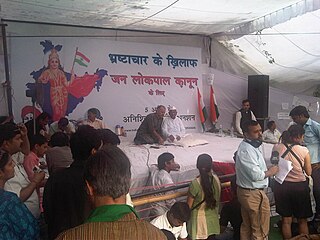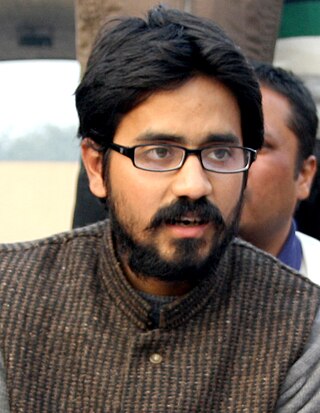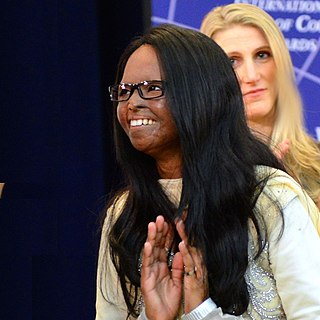
Internet activism, hacktivism, or hactivism, is the use of computer-based techniques such as hacking as a form of civil disobedience to promote a political agenda or social change. With roots in hacker culture and hacker ethics, its ends are often related to free speech, human rights, or freedom of information movements.

Bharat Sanchar Nigam Limited(abbreviated as BSNL) is a central public sector undertaking under the ownership of Department of Telecommunications, which is part of the Ministry of Communications, Government of India with its headquarters in New Delhi, India. The central public sector undertaking was established on 1 October 2000 by the Government of India. Its highest official is designated as Chairperson and Managing Director who is a central civil service group 'A' gazetted officer from Indian Communication Finance Service cadre or central engineering service group 'A' gazetted officer from Indian Telecommunication Service cadre. It provides mobile voice and internet services through its nationwide telecommunications network across India. It is the largest government-owned-wireless telecommunications service provider in India.

Internet censorship in India is done by both central and state governments. DNS filtering and educating service users in suggested usages is an active strategy and government policy to regulate and block access to Internet content on a large scale. Measures for removing content at the request of content creators through court orders have also become more common in recent years. Initiating a mass surveillance government project like Golden Shield Project is an alternative that has been discussed over the years by government bodies.

The Information Technology Act, 2000 is an Act of the Indian Parliament notified on 17 October 2000. It is the primary law in India dealing with cybercrime and electronic commerce.
The Electrohippies Collective (Ehippies) is an international group of internet activists based in Oxfordshire, England, whose purpose is to express disapproval of governmental policies of mass media censorship and control of the Internet "in order to provide a 'safe environment' for corporations to do their deals."

Project Chanology was a protest movement against the practices of the Church of Scientology by members of Anonymous, a leaderless Internet-based group. "Chanology" is a combination of "4chan" and "Scientology". The project was started in response to the Church of Scientology's attempts to remove material from a highly publicized interview with Scientologist Tom Cruise from the Internet in January 2008.

Anonymous is a decentralized international activist and hacktivist collective and movement primarily known for its various cyberattacks against several governments, government institutions and government agencies, corporations and the Church of Scientology.

The February 2010 Australian cyberattacks were a series of denial-of-service attacks conducted by the Anonymous online community against the Australian government in response to proposed web censorship regulations. Operation Titstorm was the name given to the cyber attacks by the perpetrators. They resulted in lapses of access to government websites on 10 and 11 February 2010. This was accompanied by emails, faxes, and phone calls harassing government offices. The actual size of the attack and number of perpetrators involved is unknown but it was estimated that the number of systems involved ranged from the hundreds to the thousands. The amount of traffic caused disruption on multiple government websites.

Slim Amamou ( is a Tunisian blogger and a former Secretary of State for Sport and Youth in the transitional Tunisian government of early 2011. He resigned from the role in the week of 25 May 2011 in protest of the transitional government's censorship of several websites.

The Indian anti-corruption movement, popularly known as Anna Andolan, was a series of demonstrations and protests across India that began in 2011 and was intended to establish strong legislation and enforcement against perceived endemic political corruption. The movement was named as one of the "Top 10 News Stories of 2011" by Time magazine.
Anonymous is a decentralized virtual community. They are commonly referred to as an internet-based collective of hacktivists whose goals, like its organization, are decentralized. Anonymous seeks mass awareness and revolution against what the organization perceives as corrupt entities, while attempting to maintain anonymity. Anonymous has had a hacktivist impact. This is a timeline of activities reported to be carried out by the group.

Aseem Trivedi is an Indian political cartoonist and activist, known for his anti corruption campaign Cartoons Against Corruption. He is a founder member of Save Your Voice, a movement against internet censorship in India. He is the recipient of "Courage in Editorial Cartooning Award 2012" of US based Cartoonists Rights Network International.

Nawaat is an independent collective blog co-founded by Tunisians Sami Ben Gharbia, Sufian Guerfali and Riadh Guerfali in 2004, with Malek Khadraoui joining the organization in 2006. The goal of Nawaat's founders was to provide a public platform for Tunisian dissident voices and debates. Nawaat aggregates articles, visual media, and other data from a variety of sources to provide a forum for citizen journalists to express their opinions on current events. The site does not receive any donations from political parties. During the events leading to the Tunisian Revolution of 2011, Nawaat advised Internet users in Tunisia and other Arab nations about the dangers of being identified online and offered advice about circumventing censorship. Nawaat is an Arabic word meaning core. Nawaat has received numerous awards from international media organizations in the wake of the Arab Spring wave of revolutions throughout the Middle East and North Africa.
Save Your Voice is a movement against internet censorship in India. It was founded by cartoonist Aseem Trivedi, journalist Alok Dixit, socialist Arpit Gupta and Chirag Joshi in January 2012. The movement was initially named "Raise Your Voice", before it was renamed. The movement started from Ujjain in Madhya Pradesh, under the frontier-ship of the movement's four founders; with a "Langda March" at Ujjain. The movement opposes the Information Technology Act of India and demands democratic rules for the governance of Internet. The campaign is targeted at the rules framed under the Information Technology Act, 2000.
Cartoons Against Corruption is a cartoon-based campaign mounted by the political cartoonist Aseem Trivedi to support the anti-corruption movement in India, which is best known for its sharp, hard-hitting anti-corruption cartoons. Crime Branch, Mumbai banned the website of Cartoons Against Corruption during the hunger strike of Anna Hazare in December 2011.

We Are Legion: The Story of the Hacktivists is a 2012 documentary film about the workings and beliefs of the self-described "hacktivist" collective, Anonymous.

The Day We Fight Back was a one-day global protest against mass surveillance by the US National Security Agency (NSA), the UK GCHQ, and the other Five Eyes partners involved in global surveillance. The "digital protest" took place on February 11, 2014 with more than 6,000 participating websites, which primarily took the form of webpage banner-advertisements that read, "Dear Internet, we're sick of complaining about the NSA. We want new laws that curtail online surveillance. Today we fight back." Organizers hoped lawmakers would be made aware "that there's going to be ongoing public pressure until these reforms are instituted."

Laxmi Agarwal is an Indian acid attack survivor, a campaigner for rights of acid attack victims, and a TV host. She is a former director of Chhanv Foundation, an NGO dedicated to helping acid attack survivors in India. She was attacked at the age of 15.
Arash Sadeghi is an Iranian activist and a political prisoner known best for his hunger strike as an act of protest against the detention of his wife without any judiciary proof or legal warrant. Sadeghi was a university student in Allameh Tabatabaei University in Tehran where he was expelled by the authorities due to his political activities.

Swati Maliwal is a social activist and politician. She currently serves as a Member of Parliament in the Rajya Sabha representing Delhi. She participated in the 2011 Indian anti-corruption movement led by social activist Anna Hazare and later, served as the chairperson of the Delhi Commission for Women (DCW) from 2015 to 2024.















